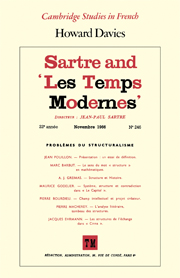Book contents
- Frontmatter
- Contents
- GENERAL EDITOR'S PREFACE
- Preface
- Acknowledgements
- Introduction
- 1 The first six years: the participation of Leiris and Lévi-Strauss
- 2 From 1951 to 1956: the rise of structuralism
- 3 Algeria: intellectual rivalries in time of war
- 4 The critique of academic knowledge
- Conclusion
- Appendix 1 Composition of the Editorial Board
- Appendix 2 Circulation figures
- Appendix 3 Categories of material to be found in Les Temps Modernes
- Appendix 4 Articles pertaining to academic anthropology
- Appendix 5 Special issues
- Notes
- Select bibliography
- Name index
- Subject index
- Cambridge Studies in French
4 - The critique of academic knowledge
Published online by Cambridge University Press: 05 February 2012
- Frontmatter
- Contents
- GENERAL EDITOR'S PREFACE
- Preface
- Acknowledgements
- Introduction
- 1 The first six years: the participation of Leiris and Lévi-Strauss
- 2 From 1951 to 1956: the rise of structuralism
- 3 Algeria: intellectual rivalries in time of war
- 4 The critique of academic knowledge
- Conclusion
- Appendix 1 Composition of the Editorial Board
- Appendix 2 Circulation figures
- Appendix 3 Categories of material to be found in Les Temps Modernes
- Appendix 4 Articles pertaining to academic anthropology
- Appendix 5 Special issues
- Notes
- Select bibliography
- Name index
- Subject index
- Cambridge Studies in French
Summary
The fourth period of TM's history covers the eight years between October 1963 and July 1971. Not only is it longer than the preceding period and equally eventful, but it moves beyond the scope of the political commentary by Burnier to which I have referred previously and which goes only as far as the mid-sixties. For these reasons I shall give it greater space. It is also the most complex period in the sense that what I shall loosely call the two competing sets of terms of reference – the Sartrean–Gorzian and the structuralist–psychoanalytical – reach a degree of animosity which radically changes the character of the review in the aftermath of 1968.
Broadly speaking, the two tendencies observed hitherto remain unreversed: there is a gradual decline in the number of literary articles and a more dramatic rise in the amount of political material (see Appendix 3). The composition of the Editorial Board is nevertheless stable and the direction collective set up in 1961 lasts (with the exception of the dismissal of Péju) until the departure of Jeanson, who in 1967 becomes too busy to continue. It is only at the end of the period that the Board suffers major upheaval with the resignations of Pingaud and Pontalis. On the other hand, the stability is perhaps more apparent than real. The occasional delay in publication is attributed to the incurie of the Board and in 1964 there is a determined attempt to recruit additional editorial staff.
- Type
- Chapter
- Information
- Sartre and 'Les Temps Modernes' , pp. 136 - 202Publisher: Cambridge University PressPrint publication year: 1987



